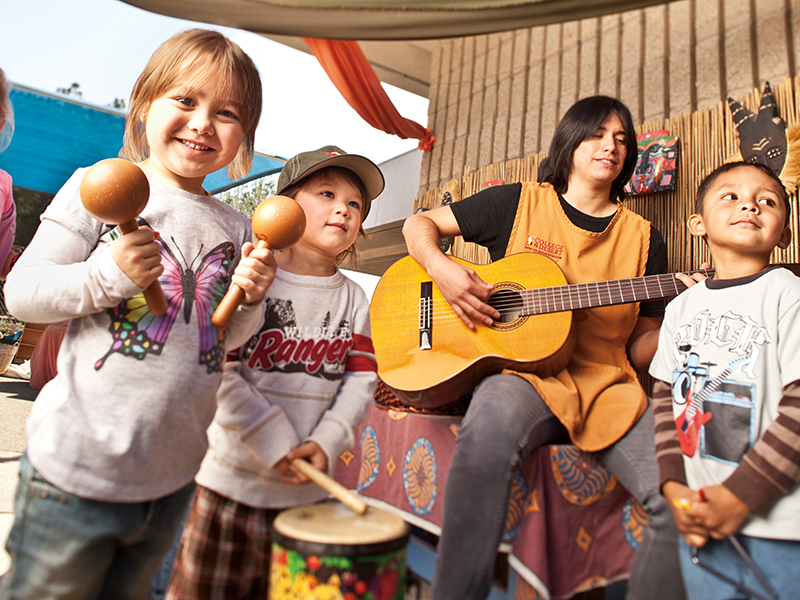Let’s Learn & Play
While Students Gain Hands-on Experience, Parents Enrolled at COD Find On-site Subsidized Childcare offering community gardens, farm-to-table meals, an outdoor musical garden and a highly awarded enrichment program making COD’s Child Development learners the luckiest toddlers in the Valley.
How COD’s Early Childhood Education Program Serves Families
While Students Gain Hands-on Experience, Parents Enrolled at COD Find On-site Subsidized Childcare.
The sound of a wailing preschooler is music to Dianne Russom’s ears. “It means they don’t want to leave,” says the Program Director of the McCarthy Child Development & Center Training on site at College of the Desert. “They may have been here all day, but they are having such a good time that they want to stay a little longer.”
With COD for 20 years and heading up the Center since 2008, Russom herself is an alumna. She was the first in her family to go to college but ensured all five of her own kids continued the legacy with three following in her footsteps to COD. She thrives on creating opportunities for children and students alike, as does her 60-person staff, making them the largest employer on campus. “If you don’t have the staff, you can’t accomplish anything – and they are wonderful.”
The childcare center fulfills dual purposes. First of all, it is a teaching facility for those enrolled in the Early Childhood Education program, which draws about 250 full- and part-time students per semester. This hands-on lab environment trains them in all aspects of child development including assessments, reports, leading a classroom, parent-teacher conferences and understanding children from various backgrounds and situations. Secondly, the Center lays a foundation of experiential learning from which it provides top-tier childcare for low- to middle-income families through state-funded subsidies. Open year round, the Center has earned contracts with the California Department of Education and the California Department of Social Services, allowing COD students to pursue their education knowing their little ones are receiving quality childcare right here on campus – as long as they maintain their grades.
An active learning environment defines every inch of the center, from the oversized outdoor musical instruments and classrooms with student observation windows to the big open space for the kids to run and play. “We use the outdoors as a classroom, not just as recess,” Russom notes. The community garden with planter boxes for each family lets kids participate in growing their own food to take home. In the kitchen garden, seasonal fruits and vegetables become part of the day’s menu. Chef Romanello prepares and serves up to 365 fresh and healthy full meals a day in their own kitchen, incorporating the seasonal produce and using very little processed food.
Resiliency plays a big part in what the Early Childhood Education students learn here, along with stick-to-it-iveness and flexibility. “When you take a child in, you have to understand the family – otherwise you won’t understand the child,” adds Russom. “They’re part of a unit, a family culture, that influences their behaviors.” After devoting 14 years to the Center, Russom knows “every child is going to have a special need at one time or another. So you can’t look at a child in isolation and be an effective teacher. You need to understand and involve that child’s family to help them through it. It’s a partnership.” She adds, “Every day will be different. But when our students are not sure what to do, we teach them to ask: ‘What’s in the best interest of the child?’ and that answers it immediately.”
The Center hires Culinary Arts students to work in the kitchen and Agriculture and ESL majors to work in the garden and classrooms. Russom has recruited from the Music and Theater programs to work in the laundry, kitchen and front office. “Nursing students do a kitchen rotation to learn about child nutrition and the kids themselves know how to plant seeds and harvest. They know where food comes from,” says Russom. These young farmers even turned into vendors for the food they had grown at a mock farmer’s market. “And one day they harvested corn, shucked it, put it in a wheelbarrow and the chef cooked it for their lunch. That’s real farm to table.”
The children gain a joy for learning and a trust in adults and teachers, says Russom, while students in the program leave with a sense of family. They graduate with working experience at COD on their resume, making them very attractive to school districts. “We help them with all the paperwork, including getting their credentials or permits from the state and we set up their portfolio with the recommendation letter because all have learned how to be a good employee,” she says. Many go on to receive a bachelor’s degree.
Russom recalls one of the Center’s many success stories that has tugged at her heartstrings. “We had hired a new student who had a baby. She looked a little rough and our hearts reached out to her. A short time later, we found out that she was living in her car with the baby. We found her housing and got her onto our nutritional program. Her graduation was a proud moment for us all. A few years later she called to thank us. She had become a Riverside County Sheriff.”
In partnership with the Patrick M. McCarthy Foundation, the COD Foundation subsidizes $50,000 in tuition for 55 children per semester, plus an additional 20 children of Veteran students. Organizations like Mary Edelman Children’s Endowment and the Rancho Mirage Women’s Club have gifted the outdoor musical garden and reading enrichment program.
The Center is a co-recipient (along with the Riverside County Office of Education) of a Golden Bell Award for inclusivity. “We have a high percentage of kids with special needs because we’re one of the only centers that welcomes them,” Russom shares. It’s also accredited by the National Association for Education, a recognition that less than 10 percent of all childcare centers, preschools and kindergartens achieve. The COD Foundation is actively fundraising to open a second center at the Indio campus in 2023, which will benefit more underserved families who are pursuing an education while feeding and enriching their children.
“We are in partnership with every family we enroll,” Russom says. “We’re here to understand them and support them, just the same as we do for all of our students in the program.”
To learn how you can support this dynamic program, email Catherine Abbott, Executive Director at cabbott@collegeofthedesert.edu.


